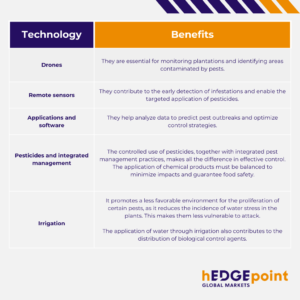
Agricultural pests cause numerous problems in coffee plantations. In this sense, they can cause direct and indirect damage that affects production and the

Agricultural pests cause numerous problems in coffee plantations. In this sense, they can cause direct and indirect damage that affects production and the quality of the final product.
As such, they even contribute to volatility in the coffee market: lower productivity brings risks to the balance between supply and demand for the commodity. In Brazil, agricultural pests require extreme attention, after all, the country is the largest producer and exporter of coffee on the planet.
With this in mind, we have put together this exclusive piece of content in which you will understand:
Enjoy the reading!
Below, we explain in detail what the 5 main agricultural pests of coffee are. Check them out below!
Problems caused by the coffee berry borer have been reported in Brazil since the 1920s. It is a beetle that reaches the fruit of the commodity and reproduces inside it. After mating, the males remain inside the fruit. The females, in turn, leave to colonize new fruits.
For this reason, the main thing that leads to borer infestation is leaving fallen fruit on the crop. It is precisely through these that the borer multiplies and grows.
As a result, the larvae of this pest consume the coffee seeds and cause damage to the quality and quantity of the harvest. Regions with higher humidity and denser plantations have a higher risk of coffee berry borer development. Therefore, crops with rainy winters may suffer more attacks.
A mite that feeds on the leaves of the coffee plant and causes the leaves to turn yellow and fall off. Subsequently, these areas become necrotic and perforation occurs in the affected area. This considerably damages the overall health of the plant.
It is a sap-sucking insect that causes damage due to its bites, as it injects toxins into the attacked plants. This species causes physical damage due to the penetration of its stylet into the plant’s phloem.
The result? Disorganization and granulation of the cells, which obstructs the vessels that carry the sap. In addition, toxic substances are also injected during feeding.
In more serious cases, there is yellowing of the leaf margins and subsequent drying out of the structures, which can cause a reduction in the size of the plants. For coffee crops, the leafhopper leads to the development of diseases and has an impact on productivity.
It is a sap-sucking insect that feeds on coffee plants and causes direct damage by feeding on the sap of the branches, leaves and fruit. This results in a general weakening of the plants, a reduction in photosynthesis capacity and a decrease in coffee bean production.
In addition, the presence of mealybugs can encourage the development of harmful fungi such as fumagina, which feed on the insects’ sugary excrement. It is therefore an agricultural pest that further damages the health and yield of coffee plants.
Coffee leaf rust (Hemileia vastatrix) is a devastating fungal disease that severely affects coffee crops. This fungus develops on the leaves of coffee plants and forms yellowish spots that eventually turn into orange pustules.
These pustules contain spores that are easily spread by wind and rainwater. Rust then compromises the leaves’ ability to photosynthesize and leads to the following consequences:
As a result, there is a significant decrease in bean production and coffee quality. The disease can spread rapidly under favorable humidity and temperature conditions and poses a constant threat to coffee plantations.
To help you understand how pests affect the coffee sector, we bring you the example of an event that affected producers in Central America and Colombia.
From 2009 to 2013, Central America and Colombia were affected by a significant outbreak of a specific pest: coffee rust (Hemileia vastatrix), which we mentioned earlier.
During this period, it caused extensive damage to coffee plantations in several Central American countries. These include Honduras, Guatemala, Costa Rica, El Salvador and Nicaragua, as well as Colombia.
The rapid spread of the rust was attributed to specific climatic conditions and the lack of adequate control measures. This outbreak had a significant impact on coffee production and resulted in crop losses.
Farmers had to implement control measures, such as applying fungicides. In addition, the situation highlighted the vulnerability of coffee plantations to disease and the need for more effective management and prevention strategies. After this period, several affected countries began planting new areas with varieties resistant to the disease.
Read more:
We talked above about the need to adopt advanced strategies for controlling coffee pests. Technology plays a central role in this.
In the table below, we explain each of the technological applications that help prevent and combat pests.

As you’ve seen, it’s important for producers to know what can affect their coffee production. This is the case with agricultural pests, as they are capable of impacting the entire final revenue targeted.
It is therefore essential that producers adopt measures to prevent and combat the emergence of these pests. Knowledge in the area makes all the difference so that they can establish the best practices for their crop and also manage it.
The hEDGEpoint HUB exists precisely for the purpose of training those involved in the agricultural commodity risk management chain. With courses adapted to different levels of knowledge, this is hEDGEpoint‘s educational tool.
Here we combine courses and financial education with in-depth research, analysis and reports. All in one place to develop risk management in commodities.
Access the hEDGEpoint HUB now and try our platform for a 1-month free trial.

Rua Funchal, 418, 18º andar - Vila Olímpia São Paulo, SP, Brasil
Contato
(00) 99999-8888 example@mail.com
Section
Home
O que Fazemos
Mercado
Quem Somos
HUB
Blog
Esta página foi preparada pela Hedgepoint Schweiz AG e suas afiliadas (“Hedgepoint”) exclusivamente para fins informativos e instrutivos, sem o objetivo de estabelecer obrigações ou compromissos com terceiros, nem de promover uma oferta ou solicitação de oferta de venda ou compra de quaisquer valores mobiliários, commodity interests ou produtos de investimento.
A Hedgepoint e suas associadas renunciam expressamente a qualquer uso das informações contidas neste documento que direta ou indiretamente resulte em danos ou prejuízos de qualquer natureza. As informações são obtidas de fontes que acreditamos serem confiáveis, mas não garantimos a atualidade ou precisão dessas informações.
O trading de commodity interests, como futuros, opções e swaps, envolve um risco substancial de perda e pode não ser adequado para todos os investidores. Você deve considerar cuidadosamente se esse tipo de negociação é adequado para você, levando em conta sua situação financeira. O desempenho passado não é necessariamente indicativo de resultados futuros. Os clientes devem confiar em seu próprio julgamento independente e/ou consultores antes de realizar qualquer transação.
A Hedgepoint não fornece consultoria jurídica, tributária ou contábil, sendo de sua responsabilidade buscar essas orientações separadamente.
A Hedgepoint Schweiz AG está organizada, constituída e existente sob as leis da Suíça, é afiliada à ARIF, a Associação Romande des Intermédiaires Financiers, que é uma Organização de Autorregulação autorizada pela FINMA. A Hedgepoint Commodities LLC está organizada, constituída e existente sob as leis dos Estados Unidos, sendo autorizada e regulada pela Commodity Futures Trading Commission (CFTC) e é membro da National Futures Association (NFA), atuando como Introducing Broker e Commodity Trading Advisor. A Hedgepoint Global Markets Limited é regulada pela Dubai Financial Services Authority. O conteúdo é direcionado a Clientes Profissionais e não a Clientes de Varejo. A Hedgepoint Global Markets PTE. Ltd está organizada, constituída e existente sob as leis de Singapura, isenta de obter uma licença de serviços financeiros conforme o Segundo Anexo do Securities and Futures (Licensing and Conduct of Business) Act, pela Monetary Authority of Singapore (MAS). A Hedgepoint Global Markets DTVM Ltda. é autorizada e regulada no Brasil pelo Banco Central do Brasil (BCB) e pela Comissão de Valores Mobiliários (CVM). A Hedgepoint Serviços Ltda. está organizada, constituída e existente sob as leis do Brasil. A Hedgepoint Global Markets S.A. está organizada, constituída e existente sob as leis do Uruguai.
Em caso de dúvidas não resolvidas no primeiro contato com o atendimento ao cliente (client.services@hedgepointglobal.com), entre em contato com o canal de ouvidoria interna (ombudsman@hedgepointglobal.com – global ou ouvidoria@hedgepointglobal.com – apenas Brasil) ou ligue para 0800-8788408 (apenas Brasil).
Integridade, ética e transparência são valores que guiam nossa cultura. Para fortalecer ainda mais nossas práticas, a Hedgepoint possui um canal de denúncias para colaboradores e terceiros via e-mail ethicline@hedgepointglobal.com ou pelo formulário Ethic Line – Hedgepoint Global Markets.
Nota de segurança: Todos os contatos com clientes e parceiros são realizados exclusivamente por meio do nosso domínio @hedgepointglobal.com. Não aceite informações, boletos, extratos ou solicitações de outros domínios e preste atenção especial a variações em letras ou grafias, pois podem indicar uma situação fraudulenta.
“Hedgepoint” e o logotipo “Hedgepoint” são marcas de uso exclusivo da Hedgepoint e/ou de suas afiliadas. O uso ou reprodução é proibido, a menos que expressamente autorizado pela HedgePoint.
Além disso, o uso de outras marcas neste documento foi autorizado apenas para fins de identificação. Isso, portanto, não implica quaisquer direitos da HedgePoint sobre essas marcas ou implica endosso, associação ou aprovação pelos proprietários dessas marcas com a Hedgepoint ou suas afiliadas.
aA Hedgepoint Global Markets é correspondente cambial do Ebury Banco de Câmbio, de acordo com a resolução CMN Nº 4.935, DE 29 DE JULHO DE 2021, Artigo 14 do Banco Central do Brasil (BACEN).
Para mais informações sobre nosso parceiro, serviços disponíveis, atendimento e ouvidoria, acesse o link a seguir: https://br.ebury.com/